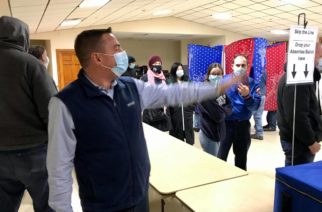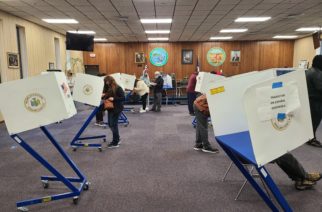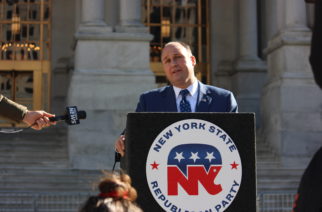
An aerial view of Rikers Island Jail, which has become one of the most divisive issues in the race for Queens Borough President this year.
Among the numerous issues being debated this election season, criminal justice reform, police reform and the Black Lives Matter movement are at the forefront of most political discussions in New York. America has become divided on the proposal of defunding the police, and in many communities across New York, the upcoming election will determine the management of police in our communities and the treatment of targeted groups moving forward.
Queens is the largest geographic borough in New York City and sustains a large economy due to major industries such as construction, transportation and retail. Urban and rural areas are sprinkled throughout the borough.
In January 2020 Melinda Katz became the District Attorney for Queens County, opening up the seat for Queens Borough President. Democratic City Councilman Donovan Richards and Queens County Republican Chair Joann Ariola have deemed themselves fit for the job. Their campaigns actually share a lot of similarities; they both agree on the need for better transportation, better jobs and affordable housing and supporting small businesses.
However, Ariola and Richards hold different viewpoints on the prison occupying Rikers Island; this seems to be their most divisive issue. Both candidates failed to respond to a request to be interviewed in regard to their campaigns.

Richards has resided between Southeast Queens and the Rockaways for the majority of his life. Since 2013, he has served as the representative for District 31 on the New York City Council. A longtime advocate for criminal justice reform, Richards is the chair of various New York City council committees including the Committee on Public Safety.
Ariola currently resides in Howard Beach, Queens, and is a wife, mother, grandmother and health care worker. She has previously worked at the Queens District Attorney’s Office, Queens Criminal Court, and the NYC Council as both the chief of staff and press secretary for Queens and Brooklyn. Ariola has been extremely vocal in supporting the New York City Police Department.
There are 1,184,884 active voters in Queens: 766,213 Democrats, 126,670 Republicans and 253,716 independent voters.
Ariola’s campaign is seeking to maintain the prison on Rikers Island and she has been adamantly supportive of the New York Police Department throughout this summer of protests. On Oct.7, 2020 Ariola posted to her Instagram account criticizing the “defund the police” movement, saying that doing so is dangerous because it will increase crime. According to a Facebook post on Oct. 8, 2020, she believes that establishing new prisons in our neighborhoods will be too costly and bring crimes closer to our communities. Her plan is to work with both the NYPD and the Queens population to establish an environment where people can feel safe going about their daily lives.
Richards, on the other hand, is in favor of closing down the prison on Rikers Island. In an article he wrote for the Queens Daily Eagle, Richards offers a first-hand experience of losing his childhood friend to gun violence and wants to construct a new police precinct in Southeast Queens in a bid to make the streets of Queens safer. Richards believes that since it costs more than $200,000 a year to confine only one inmate at Rikers Island, it will be more cost-efficient to shut it down.
Richards’ campaign highlights how Rikers Island is a perpetrator of systemic racism, as Black and Brown people are more likely to be caught up in the cycle of being released only to be reincarcerated due to lack of resources and support following their release. Richards says this cycle occurs because Rikers fails in rehabilitating or providing vocational training to inmates during their time in prison, leaving the released to resort to the crooked actions that caused them to be convicted in the first place. He wants to invest in inmates and provide them the opportunity to flourish once they are released, which in turn will benefit their communities.









